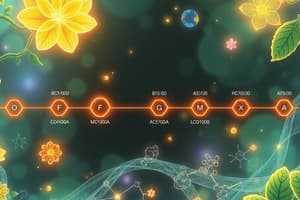Podcast
Questions and Answers
Which of the following is considered a major class of phytoestrogens?
Which of the following is considered a major class of phytoestrogens?
- Flavonoids
- Lignans (correct)
- Stilbenes
- Terpenes
What is the primary lignan precursor found in flaxseed?
What is the primary lignan precursor found in flaxseed?
- Secoisolariciresinol diglucoside (correct)
- Pinoresinol
- Enterodiol
- Matairesinol
Which compound is NOT a type of plant lignan?
Which compound is NOT a type of plant lignan?
- Pinosylvin (correct)
- Secoisolariciresinol
- Enterolactone
- Lariciresinol
How much do Lariciresinol and Pinoresinol contribute to total dietary lignan intake?
How much do Lariciresinol and Pinoresinol contribute to total dietary lignan intake?
Which substance is formed from plant lignans by intestinal bacteria?
Which substance is formed from plant lignans by intestinal bacteria?
What is formed by the reduction of the carboxylic acid functional groups in cinnamic acids?
What is formed by the reduction of the carboxylic acid functional groups in cinnamic acids?
Which acid is a precursor to p-coumaric acid?
Which acid is a precursor to p-coumaric acid?
Which substance is derived from monolignols and is a primary constituent of essential oils?
Which substance is derived from monolignols and is a primary constituent of essential oils?
What is the structural role of lignin and suberin in plants?
What is the structural role of lignin and suberin in plants?
What is chalcone a precursor for?
What is chalcone a precursor for?
Which of the following is a hydroxylated derivative of p-coumaric acid?
Which of the following is a hydroxylated derivative of p-coumaric acid?
Which of these compounds absorbs ultraviolet light strongly and is used in sunscreens?
Which of these compounds absorbs ultraviolet light strongly and is used in sunscreens?
Which compound is NOT derived from monolignols?
Which compound is NOT derived from monolignols?
What primary metabolites are converted in the Shikimate pathway to produce chorismate?
What primary metabolites are converted in the Shikimate pathway to produce chorismate?
Which of the following amino acids are synthesized through the Shikimate pathway?
Which of the following amino acids are synthesized through the Shikimate pathway?
What is one key role of chorismate in plant metabolism?
What is one key role of chorismate in plant metabolism?
Which compound is NOT a product of the phenylpropanoid pathway derived from phenylalanine?
Which compound is NOT a product of the phenylpropanoid pathway derived from phenylalanine?
In the context of biochemistry, which of the following pathways is primarily associated with terpenoids and steroids?
In the context of biochemistry, which of the following pathways is primarily associated with terpenoids and steroids?
The Shikimate pathway is often referred to as the common aromatic biosynthetic pathway due to its role in producing which type of compounds?
The Shikimate pathway is often referred to as the common aromatic biosynthetic pathway due to its role in producing which type of compounds?
What role does phenylalanine play in protein synthesis?
What role does phenylalanine play in protein synthesis?
Which of the following aromatic compounds is synthesized directly through the pathway involving chorismate?
Which of the following aromatic compounds is synthesized directly through the pathway involving chorismate?
What role does indoleacetic acid, derived from tryptophan, play in plants?
What role does indoleacetic acid, derived from tryptophan, play in plants?
Which amino acids are involved in the biosynthesis of phenylpropanoids?
Which amino acids are involved in the biosynthesis of phenylpropanoids?
What is the function of phenylpropanoids in plants?
What is the function of phenylpropanoids in plants?
Which enzyme converts phenylalanine to cinnamic acid?
Which enzyme converts phenylalanine to cinnamic acid?
What process synthesizes aromatic amino acids in plants?
What process synthesizes aromatic amino acids in plants?
What is the primary function of phytoalexins in plants?
What is the primary function of phytoalexins in plants?
Which compound is a common example of a volatile component derived from phenylpropanoids?
Which compound is a common example of a volatile component derived from phenylpropanoids?
Which of the following statements about the shikimate pathway is true?
Which of the following statements about the shikimate pathway is true?
Which of the following compounds is an example of a stilbenoid?
Which of the following compounds is an example of a stilbenoid?
What series of reactions occur after the formation of cinnamic acid?
What series of reactions occur after the formation of cinnamic acid?
How are stilbenoids chemically classified?
How are stilbenoids chemically classified?
What is one reported health benefit of resveratrol?
What is one reported health benefit of resveratrol?
Which method is commonly used for the synthesis of umbelliferone?
Which method is commonly used for the synthesis of umbelliferone?
What characteristic distinguishes stilbenoids from other phytoalexins?
What characteristic distinguishes stilbenoids from other phytoalexins?
What role do stilbenoids potentially play in tree diseases?
What role do stilbenoids potentially play in tree diseases?
How do stilbenoids exert their biological activities?
How do stilbenoids exert their biological activities?
Flashcards
Shikimate Pathway
Shikimate Pathway
A metabolic pathway in plants that creates aromatic amino acids and phenylpropanoids.
Chorismate
Chorismate
A key intermediate in the Shikimate Pathway, used to build aromatic compounds.
Aromatic Amino Acids
Aromatic Amino Acids
Phenylalanine, tyrosine, and tryptophan, essential for proteins.
Phenylpropanoids
Phenylpropanoids
Signup and view all the flashcards
Mevalonate Pathway
Mevalonate Pathway
Signup and view all the flashcards
Terpenoids
Terpenoids
Signup and view all the flashcards
Essential Amino Acids
Essential Amino Acids
Signup and view all the flashcards
Phenylalanine
Phenylalanine
Signup and view all the flashcards
Cinnamic Acid
Cinnamic Acid
Signup and view all the flashcards
Coumaric Acid
Coumaric Acid
Signup and view all the flashcards
Monolignols
Monolignols
Signup and view all the flashcards
Cinnamaldehyde
Cinnamaldehyde
Signup and view all the flashcards
What are phenylpropenes?
What are phenylpropenes?
Signup and view all the flashcards
Umbeliferone
Umbeliferone
Signup and view all the flashcards
What is coumaroyl-CoA?
What is coumaroyl-CoA?
Signup and view all the flashcards
Chalcones
Chalcones
Signup and view all the flashcards
What is the Shikimate Pathway?
What is the Shikimate Pathway?
Signup and view all the flashcards
Tryptophan
Tryptophan
Signup and view all the flashcards
Indoleacetic Acid (IAA)
Indoleacetic Acid (IAA)
Signup and view all the flashcards
What are Phenylpropanoids?
What are Phenylpropanoids?
Signup and view all the flashcards
PAL (Phenylalanine ammonia-lyase)
PAL (Phenylalanine ammonia-lyase)
Signup and view all the flashcards
What are lignans?
What are lignans?
Signup and view all the flashcards
What are the main classes of phytoestrogens?
What are the main classes of phytoestrogens?
Signup and view all the flashcards
What are the mammalian lignans?
What are the mammalian lignans?
Signup and view all the flashcards
What are the main sources of lignans in the diet?
What are the main sources of lignans in the diet?
Signup and view all the flashcards
What are the two most common plant lignans?
What are the two most common plant lignans?
Signup and view all the flashcards
Stilbenoids
Stilbenoids
Signup and view all the flashcards
Phytoalexins
Phytoalexins
Signup and view all the flashcards
Resveratrol
Resveratrol
Signup and view all the flashcards
Coumarin
Coumarin
Signup and view all the flashcards
What is the Pechmann Condensation?
What is the Pechmann Condensation?
Signup and view all the flashcards
How do stilbenoids act as phytoalexins?
How do stilbenoids act as phytoalexins?
Signup and view all the flashcards
What are some of the benefits associated with resveratrol?
What are some of the benefits associated with resveratrol?
Signup and view all the flashcards
Study Notes
Terrestrial Natural Product Chemistry
- Shikimate Pathways (or Shikimic Acid Pathways): A crucial biosynthetic pathway in plants and some microbes, responsible for producing aromatic amino acids and secondary metabolites.
- Shikimate pathway overview: Converts primary metabolites phosphoenolpyruvate and erythrose-4-phosphate to chorismate.
- Chorismate's role: Essential for the biosynthesis of diverse aromatic plant metabolites, including phenylalanine, tyrosine, and tryptophan (essential for protein synthesis) and other compounds like tetrahydrofolate, ubiquinone, and vitamin K.
- Phenylalanine's role: Used in protein synthesis and as a substrate for the phenylpropanoid pathway. This path creates a variety of secondary products like anthocyanins, lignin, growth promoters, and phenolics.
- Indoleacetic acid: A plant hormone derived from tryptophan, essential for cell expansion, maintaining apical dominance, and other regulatory functions in plants.
- Biosynthesis Pathways: Different pathways exist for different types of natural products - Mevalonate Pathways (terpenoids/steroids), Polyketide/acetogenin/acetate-malonate pathways (aromatic compounds), and Alkaloids Pathways (alkaloids)
### Phenylpropanoids
- Definition: A diverse group of natural products.
- Biosynthesis: Synthesized from phenylalanine or tyrosine amino acids through a series of enzymatic reactions.
- Functions: Provide a diverse array of functions, including defense against herbivores, protection from microbial attack, structural components of cell walls, UV protection, pigments, and signaling molecules.
Coumarins
- Biosynthesis: p-coumaric acid is hydroxylated in the 4-position.
- Modifications: Can be further modified into hydroxylated derivatives.
- Key Role: Production of chalcone. Achieving this involves adding three malonyl-CoA molecules then cyclizing into a second phenyl group.
Umbelliferone
- Natural Product: 7-hydroxycoumarin.
- Occurrence: Found in members of the Apiaceae family, like carrots and coriander.
- Chemical Properties: Yellowish-white crystalline solid, with limited water solubility but increased solubility in ethanol. Strong absorption of UV light at specific wavelengths.
- Uses: Composed in sunscreen creams and lotions due to UV absorption.
Umbelliferone Synthesis
- Method: Traditionally made through the Pechmann condensation, involving resorcinol and formylacetic acid (formed from malic acid in situ).
Stilbenoids
- Derivatives: Hydroxylated derivatives of stilbene.
- Biosynthesis: Formed through an alternative cyclization of cinnammoyl-CoA or 4-coumaroyl-CoA.
- Examples: Resveratrol, an example.
- Properties: Secondary plant products involved in heartwood formation, acting as phytoalexins.
- Biochemical class: Belong to the phenylpropanoid family, sharing biosynthetic pathways with chalcones.
Phytoalexins
- Definition: Antimicrobial substances made by plants.
- Formation: Accumulates rapidly in plant cells at sites of incompatible pathogen infection.
- Diversity: Exhibit chemical diversity and are specific to certain plant species.
- Classes: Some classes include terpenoids, glycosides, and alkaloids.
- Role: Play a protective role in plant defense.
Resveratrol
- Type: Phytoalexin produced by several plants.
- Method of Production: Can be synthesized chemically as well.
- Purpose: Sold as a nutritional supplement.
- Health Benefits: Reported to have anti-cancer, antiviral, neuroprotective, anti-aging, and inflammatory effects.
- Source: Found in the skin of red grapes.
Lignans
- Definition: Chemical compounds found in plant foodstuffs.
- Type: Phytoestrogens acting as antioxidants.
- Biosynthesis Via: Formed by the dimerization or joining of substituted cinnamic alcohols.
- Examples: Pinoresinol, podophyllotoxin, and steganacin.
- Dietary Conversion: When consumed, they are converted into mammalian lignans (enterodiol and enterolactone) by intestinal bacteria.
Lignin
- Complex Structure: A complex polymer made up of various repeating structural units and joined coniferyl/hydroxyconiferyl alcohols.
- Role: Acts as a major structural component of the cell walls of plants.
Phenylpropenes
- Other Derivatives: Includes eugenol, chavicol, safrole, and estragole.
- Source: Derived from monolignols.
- Role: Primary components of various essential oils.
Studying That Suits You
Use AI to generate personalized quizzes and flashcards to suit your learning preferences.




